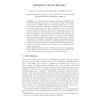Free Online Productivity Tools
i2Speak
i2Symbol
i2OCR
iTex2Img
iWeb2Print
iWeb2Shot
i2Type
iPdf2Split
iPdf2Merge
i2Bopomofo
i2Arabic
i2Style
i2Image
i2PDF
iLatex2Rtf
Sci2ools
100
Voted
ICFEM
2009
Springer
2009
Springer
Qualitative Action Systems
An extension to action systems is presented facilitating the modeling of continuous behavior in the discrete domain. The original action system formalism has been developed by Back et al. in order to describe parallel and distributed computations of discrete systems, i.e. systems with discrete state space and discrete control. In order to cope with hybrid systems, i.e. systems with continuous evolution and discrete control, two extensions have been proposed: hybrid action systems and continuous action systems. Both use differential equations (relations) to describe continuous evolution. Our version of action systems takes an alternative approach by adding a level of abstraction: continuous behavior is modeled by Qualitative Differential Equations that are erred choice when it comes to specifying abstract and possibly non-deterministic requirements of continuous behavior. Because their solutions are transition systems, all evolutions in our qualitative action systems are discrete. Bas...
Related Content
| Added | 26 May 2010 |
| Updated | 26 May 2010 |
| Type | Conference |
| Year | 2009 |
| Where | ICFEM |
| Authors | Bernhard K. Aichernig, Harald Brandl, Willibald Krenn |
Comments (0)

